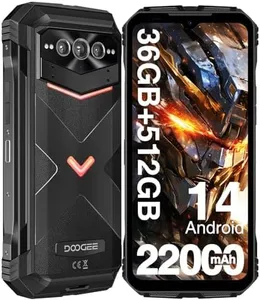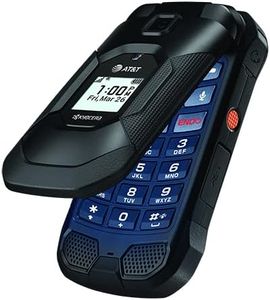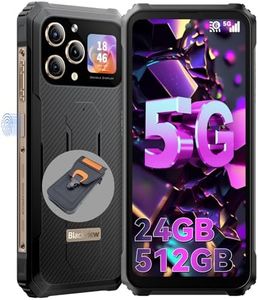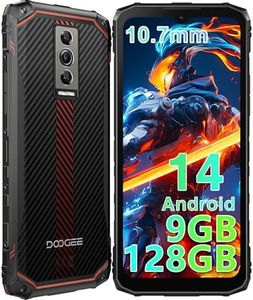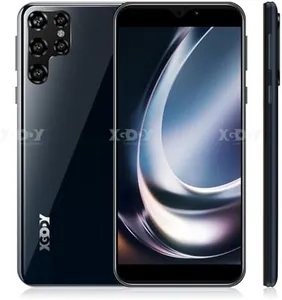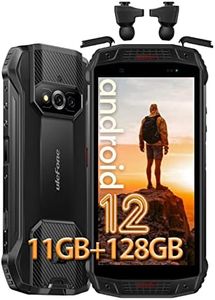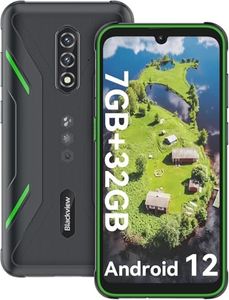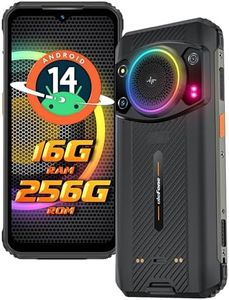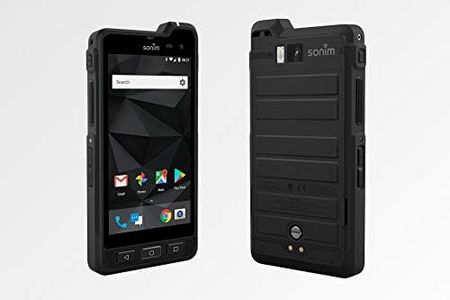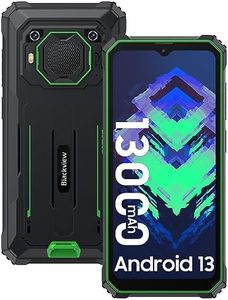10 Best Tough Phones 2025 in the United States
Our technology thoroughly searches through the online shopping world, reviewing hundreds of sites. We then process and analyze this information, updating in real-time to bring you the latest top-rated products. This way, you always get the best and most current options available.

Our Top Picks
Winner
Ulefone Armor 24 Rugged Phone Unlocked, 22000mAh Big Battery 66W, 24GB+256GB Android 14 Waterproof Smartphone, 6.78" FHD+, 64MP IR Night Vision Camera,1000LM LED Light, 4G LTE NFC GPS OTG FM
Most important from
227 reviews
The Ulefone Armor 24 is a solid choice for those needing a tough phone. Its standout feature is the massive 22000mAh battery, ensuring incredibly long battery life, perfect for extended outdoor adventures or demanding work environments. The 66W fast charging also means you won't be waiting around for it to power up. Durability is top-notch with IP68/IP69K ratings and MIL-STD-810H certification, making it resistant to water, dust, and drops. This tough design is ideal for outdoor enthusiasts and workers in harsh conditions.
The 6.78-inch FHD+ display offers good protection with scratch resistance, though its large size and weight (647g) may be a downside for some users, especially if they prefer lighter phones. Performance-wise, the MediaTek Helio G96 chip and 24GB RAM (including expansion) handle everyday tasks smoothly, although high-end gaming or extremely intensive apps may not be its forte. The camera setup is impressive, featuring a 64MP main camera, 64MP night vision camera, and a 16MP front camera, ensuring decent photo quality in various lighting conditions. The 1000 lumens LED camping light is a unique and practical feature for night-time activities.
Connectivity options are comprehensive with support for 4G LTE, NFC, GPS, and OTG functionalities. However, it’s worth noting that it is not compatible with some US carriers like AT&T and Verizon. In conclusion, the Ulefone Armor 24 is robust, has excellent battery life, decent performance, and useful features for outdoor and demanding work environments, though its weight and carrier compatibility might be limiting factors for some.
Most important from
227 reviews
KYOCERA New E4830 DuraXE Epic AT&T/Unlocked FirstNet Flip 16GB Rugged PTT Wi-Fi LTE Black (US Warranty) NO Verizon
Most important from
57 reviews
The KYOCERA New E4830 DuraXE Epic is a rugged flip phone designed for durability and versatility, making it suitable for harsh environments. It boasts MilSpec impact and water resistance, ensuring it can withstand tough conditions. The phone is FirstNet certified with band 14, providing reliable and secure communication for emergency responders. Additionally, it can work with AT&T and T-Mobile networks but not Verizon, Straight Talk, Tracfone, Xfinity, or Spectrum Mobile. This limitation may be a drawback for users on those networks.
The 16GB internal storage is expandable up to 512GB with a microSD card, which is helpful for storing more data and media. Its 1.3 GHz dual-core processor and 2GB of RAM are adequate for basic tasks but might struggle with more intensive applications. The small 2.6-inch display with a resolution of 320 x 240 may not be ideal for those who require a larger, clearer screen.
Battery life is decent, with a 1770 mAh capacity providing up to 20 hours of talk time, but heavy users might find themselves needing to recharge frequently. Connectivity options include Bluetooth, Wi-Fi, and USB, offering flexibility in connecting to other devices. The camera quality is basic, with only a rear camera, so users seeking high-quality photos might be disappointed. Despite its limitations, the DuraXE Epic is a strong contender for those needing a durable phone for tough environments, particularly for users in emergency services or outdoor industries.
Most important from
57 reviews
Blackview BL8000 5G Rugged Smartphone, 24GB+512GB SD 2TB Rugged Phones, 6.78" 2.4K 120Hz Android Cell Phone +1.32" Back Display, 50MP+16MP Camera, 8800mAh/33W, IP68 Waterproof, 5G LTE, Fingerprint/NFC
Most important from
5 reviews
The Blackview BL8000 5G Rugged Smartphone is an impressive device designed for users who need a durable and high-performance phone. It boasts a robust build with IP68/IP69K waterproof and STD-MIL-810H drop-proof certifications, making it ideal for outdoor and demanding environments. The Corning Gorilla Glass 7 adds extra protection against drops and scratches. Its 8800mAh battery ensures long-lasting usage, and the 33W fast charger minimizes downtime, which is great for users on the go.
The 6.78-inch 2.4K FHD+ display with a 120Hz refresh rate offers vibrant visuals and smooth scrolling, benefiting both media consumption and gaming enthusiasts. The additional 1.32-inch rear screen provides quick access to essential functions without draining the main battery. Performance-wise, the Dimensity 7050 5G processor paired with up to 24GB of RAM ensures seamless multitasking and gaming. The extensive 512GB storage, expandable up to 2TB, is excellent for users who need significant storage space.
The camera setup, featuring a 50MP main camera, 8MP ultra-wide, and 16MP front camera, captures high-quality images and videos in various conditions, including underwater. Connectivity options are broad, supporting 5G, dual SIM, NFC, and WiFi 6, which ensures fast and reliable communication. However, it is worth noting the phone's compatibility issues with certain carriers like AT&T and Verizon. Additionally, its weight of 1.61 pounds might be cumbersome for some users, and the absence of a headphone jack could be inconvenient for those who prefer wired audio. The phone runs on the latest Android 13 with a user-friendly Doke OS 4.0 UI, offering enhanced privacy and personalization features. With a two-year warranty, the Blackview BL8000 is a reliable choice for those seeking a rugged, high-performance smartphone.
Most important from
5 reviews
Buying Guide for the Best Tough Phones
When choosing a tough phone, it's important to consider the specific needs and environments in which the phone will be used. Tough phones are designed to withstand harsh conditions, making them ideal for outdoor activities, construction sites, or any situation where a regular phone might not survive. To ensure you pick the best tough phone for your needs, focus on the key specifications that determine the phone's durability, performance, and usability in challenging conditions.FAQ
Most Popular Categories Right Now
